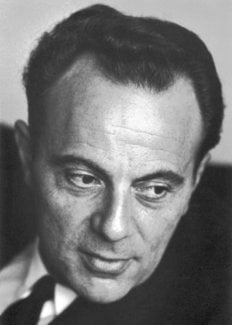François Jacob
Biographical

François Jacob was born in June 1920 in Nancy (France). He was the only son of Simon Jacob and Thérèse Franck. After attending the Lycée Carnot in Paris, he began studying medicine at the Faculty of Paris, with the intention of becoming a surgeon. These studies were interrupted by the war. In June 1940, when in his second year of medicine, he left France and joined the Free French Forces in London. He was sent to Africa as a medical officer and saw action in Fezzan, Libya, Tripolitania and Tunisia, where he was wounded. He was posted to the Second Armoured Division, and was severely wounded in Normandy, in August 1944. He remained in the hospital for seven months, and was awarded the Croix de la Libération, the highest French military decoration of this war.
After the war, François Jacob completed his medical studies and submitted his doctoral thesis in Paris in 1947. He was unable to practise surgery on account of his injuries, and worked in various fields before turning to biology. He obtained a science degree in 1951, and then a doctorate in science in 1954 at the Sorbonne, with a thesis on «Lysogenic bacteria and the provirus concept».
In 1950, François Jacob joined the Institut Pasteur under Dr. André Lwoff. He was appointed Laboratory Director in 1956, then in 1960 Head of the Department of Cell Genetics, recently created at the Institut Pasteur. In 1964 he was appointed Professor at the Collège de France, where a chair of Cell Genetics was created for him.1
The work of François Jacob has dealt mainly with the genetic mechanisms existing in bacteria and bacteriophages, and with the biochemical effects of mutations. He first studied the properties of lysogenic bacteria and demonstrated their «immunity», i.e. the existence of a mechanism inhibiting the activity of genes in the prophage as in infective particles of the same type. In 1954 he began a long and fruitful collaboration with Elie Wollman, in an attempt to establish the nature of the relationships between the prophage and genetic material of the bacterium. This study led to a definition of the mechanism of bacterial conjugation, and also enabled an analysis of the genetic apparatus of the bacterial cell. From this work there emerged a whole series of new concepts, such as the oriented process of genetic transfer from the male to the female, the circularity of the bacterial chromosome or the episome concept. The whole of this work was summarized in a book Sexuality and the Genetics of Bacteria.
In 1958 the remarkable analogy revealed by genetic analysis of lysogeny and that of the induced biosynthesis of ß-galactosidase led François Jacob, with Jacques Monod, to study the mechanisms responsible for the transfer of genetic information as well as the regulatory pathways which, in the bacterial cell, adjust the activity and synthesis of macromolecules. Following this analysis, Jacob and Monod proposed a series of new concepts, those of messenger RNA, regulator genes, operons and allosteric proteins.
In 1963, together with Sydney Brenner, François Jacob put forward the «replicon» hypothesis to account for certain aspects of cell division in bacteria. Since then, he has devoted his attention to the genetic analysis of the mechanisms of cell division. In 1970 he began to study cultured mammalian cells, particularly certain aspects of their genetic properties.2
In 1970, François Jacob published a book La logique du vivant, une Histoire de l’Hérédité, in which, beginning with the 16th century, he traces the stages in the study of living beings that have led up to molecular biology.3
François Jacob has been awarded a number of French scientific prizes, notably the Charles Léopold Mayer prize by the Académie des Sciences (1962). He is a foreign member of the Danish Royal Academy of Arts and Sciences (1962), the American Academy of Arts and Sciences (1964), the National Academy of Sciences of the United States (1969), and the American Philosophical Society (1969). He has received honorary degrees from several universities. He was invited to give a Harvey Lecture (New York, 1958) and the Dunham Lectures (Harvard, 1964).4
In 1947 François Jacob married the pianist Lise Bloch. They have four children: Pierre (born in 1949), who has become a philosopher, Laurent and Odile (born in 1952) and Henri (born in 1954), who are still undifferentiated.5
This autobiography/biography was written at the time of the award and first published in the book series Les Prix Nobel. It was later edited and republished in Nobel Lectures. To cite this document, always state the source as shown above.
The biography was updated by the Laureate in April 2005:
1. He has been Chairman of the Board of the Institut Pasteur from 1982 to 1988.
2. In the last decade, François Jacob has shifted to the study of the early stage of development in the mouse embryo using mouse teratocarcinoma as a tool. His main goal is to analyze the regulatory circuits involved in development and cellular differenciation of the early embryo.
3. In 1981, he published Le Jeu des Possibles, a view on evolution and its mechanisms. In 1987, he published an autobiography La Statue Intérieure, and in 1997 he published La Souris, la Mouche et l’Homme.
4. François Jacob is a member of the Académie des Sciences, Paris (1977) and of the Académie Française, Paris (1996). He is a foreign member of the Royal Society, London (1973), the Académie Royale de Médecine de Belgique (1973), the Academy of Sciences of Hungary (1986), the Royal Academy of Sciences, Madrid (1987).
5. Lise Bloch died. Second marriage in 1999 with Geneviève Barrier.
For more biographical information, see:
Jacob, François, The Statue Within: An Autobiography. Basic Books, New York, 1988.
François Jacob died on 19 April 2013.
Nobel Prizes and laureates
Six prizes were awarded for achievements that have conferred the greatest benefit to humankind. The 14 laureates' work and discoveries range from quantum tunnelling to promoting democratic rights.
See them all presented here.
